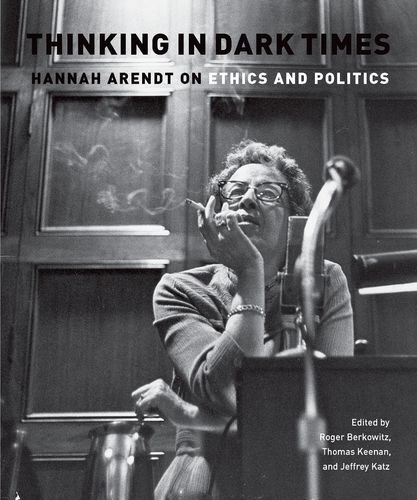Thinking In Dark Times
Hannah Arendt is one of the most important political theorists of the twentieth century. Born into a secular German-Jewish family, she studied then Heidegger and Jaspers. Under the pressure of increasing anti-Semitism, she fled Germany for France in 1933, then immigrated to the United States in 1941. There she taught in various American universities and was active in Jewish affairs until her death in 1975. In her works, she grappled with the dark events of her times, probing the nature of power, authority, and evil, and seeking to confront totalitarian horrors on their own terms. This book focuses on how, against the professionalized discourses of theory, Arendt insists on the greater political importance of the ordinary activity of thinking. Indeed, she argues that the activity of thinking is the only reliable protection against the horrors that buffeted the last century. Its essays explore and enact that activity, which Arendt calls the habit of erecting obstacles to oversimplifications, compromises, and conventions.Most of the essays were written for a conference at Bard College celebrating the 100th anniversary of Arendt's birth. Bard has a special tie with Arendt. Her husband taught there for many years, and on her death Arendt left her personal library and literary effects to Bard. She is buried in the Bard College cemetery. Material from the Bard archive - such as a postcard to Arendt from Walter Benjamin or her annotation in her copy of Machiavelli's The Prince - and images from her life are interspersed with the essays in this volume. The interest of these materials, most shown here for the first time, adds to the accessibility and incisive immediacy of the essays.The volumewill offer provocations and insights to Arendt scholars, students discovering Arendt's work, and general readers attracted to Arendt's vision of the importance of thinking in our own dark times.
Reviews
"These essays were written in honour of what would have been Hannah Arendt's 100th birthday, an apt occasion on which to commemorate this great theorist of natality. And what a gift this volume is! Packed with innovative readings of her work and life, Thinking in Dark Times re-embeds Arendt in the worldliness from which she proudly took her own bearings. The questions raised regarding political action, torture, truth in politics, intellectual life, antisemitism and the destructiveness to democracy of chatter, withdrawal, rage and dishonesty are, to say the least, pressing. Thus, the volume assaults the reader with its urgency. But it is also timeless, as the best scholarship is. It stands all by itself as testimony to why Arendt continues to grab the attention of scholars of politics, culture and literature."
--Bonnie Honig, author of Democracy and the Foreigner.
"Artfully balancing conceptual precision and editorial care with a deep sense of urgency, this volume of essays on one of the 20th century's great theorists of totalitarianism and anti-Semitism offers a stimulating examination of Arendt's political and philosophical writings. The pieces analyze the sociopolitical ramifications of her life as well as more focused discussions of key topics in the social and the political realms. Cathy Caruth offers an exemplary reading of the relationship between the Pentagon Papers and Arendt's notion of the modern political lie that attempts not simply to cover over mistakes but to replace reality entirely by fabricating new histories. Uday Mehta gives a fascinating outline of Arendt's views on politics and terror, while Christopher Hitchens offers some brief, idiosyncratic reflections on anti-Semitism. Contributors return repeatedly to Arendt's 1963 coverage of the trial of Nazi official Adolf Eichmann. The essays lack a consensus on Arendt's notion of the "banality of evil," but it is precisely the rich variety of interpretations together with a wonderful selection of images from her personal library that make the collection so compelling." (Jan.)
-- Publishers Weekly
"Berkowitz, Katz, and Keenan have compiled a major addition to scholarship on Arendt while continuing her bracing, argumentative, and life-promotiong political commitments."
--Kennan Ferguson, Author of The Politics of Judgment.
"This volume succeeds in approaching Hannah Arendt's philosophy with a fresh eye."
--Jill Stauffer, editor of Nietzsche and Levinas.
Purchase
You can purchase a paperback copy of Thinking in Dark Times
from any of the following locations:
